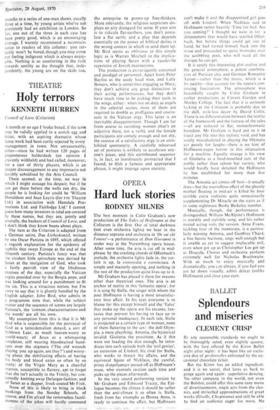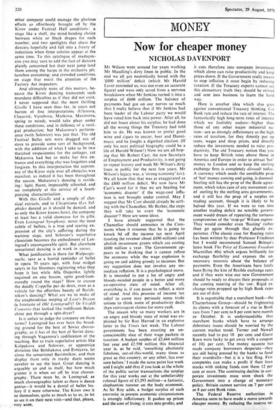BALLET
Splendours and miseries
CLEMENT CRISP
By any reasonable standards we ought to be thoroughly sated, even slightly queasy, with the fare offered by the Kirov Ballet night after night: it has been like an exclu- sive diet of pro fiterolles enlivened by the oc- casional chocolate eclair.
But the Kirov has an added ingredient, and it is no secret, that lures us back to gorge again and again : superlative dancing. No other company in the world, not even the Bolshoi, could offer this same zany menu of divertissements, single acts from the clas- sics, and shrivelled approximations of great works (Girdle, Chopiniana) and still be able to find an audience eager for more. No
other company could manage the glorious effects so effortlessly brought off by the Kirov under Festival Hall conditions: a stage like a shelf, the mind-bending choice between white or black drapes for each number, and two spotlights that chase the dancers hopefully and fall into a frenzy of indecision when three soloists appear at the same time. To this catalogue of inadequa4 cies you may care to add the fact of dancers plainly concerned lest their next jump land them among the harps in the orchestra pit; tasteless costuming; and crowded conditions on stage that merit the attention of the Factory Act inspectors.
And ultimately none of this matters, be- cause the Kirov dancing transcends such mundane difficulties as if they did not exist. I never supposed that the most thrilling Oiselie I have seen thus far, in years not barren of fine interpretations (Ulanova, Chauvire, Vyrubova, Markova, Maximova, spring to mind), would take place under these conditions, and in defiance of a vesti- gial production; but Makarova's perform- ance (with Soloviev) was just that. The old Festival Ballet sets were dragged out of store to provide some sort of background, with the addition of what I take to be two thatched vespasiennes for the cottages, yet Makarova had but to make her first en- trance and everything else was forgotten and forgiven. In this interpretation the suprem- acy of the Kirov style over all obstacles was manifest, as indeed it has been throughout the season. Makarova's dancing is ravish- ing: light, fluent, impeccably schooled, and set completely at the service of a heart- piercing characterisation.
With this Giselle and a couple of clas- sical extracts, and in Chopiniana (Les Syl- phides danced as it should be danced, and as only the Kirov knows how), the company at least has a valid showcase for its gifts. Even Leningrad Symphony, never the most subtle of ballets, is a true and searing ex- pression of the city's suffering during the wartime siege, and Soloviev's superlative classicism becomes the embodiment of Len- ingrad's unconquerable spirit. But elsewhere sensational dancing is at work in vactio.
What justification is there for Walpurgis- nacht, save as a horrid reminder of ballet in opera 70 years ago, with four midget satyrs in fur bloomers registering what they hope is lust while Alla Osipenko, lightly sequined on one bosom, spins good-hum- ouredly round the stage? How to excuse the deadly Coppelia pas de deux, even as a vehicle for the effortless beauty of Barish- nikov's dancing? What are we to make of the anaphrodisiac moping of Love's Dream (a foretaste of Oh! Leningrad!)? Or Vivaldi Concerto that looked like indifferent Balan- chine put through a spin-dryer?
Is it unfair to judge the company on these
terms? Leningrad has ever been the breed- ing ground for the best of Soviet choreo- graphy, as it has of the best of Soviet danc- ing through Vaganova's codification of the teaching. But to train superlative artists like Kolpakova and Soloviev, or apprentice divinities like Bolshakova and Evteyeva. let alone the sensational Barishnikov, and then display them only in trashy duets seems cavalier to say the least. Great dancing is arguably an end in itself, but how much greater it is when set off by true choreo- graphy. There must be, in Leningrad, as much choreographic talent as there is dance genius—it would be a denial of ballet his- tory if it were otherwise. The Kirov owe it to themselves, quite as much as to us, to let us see it on their next visit—and that, please, very soon,































 Previous page
Previous page